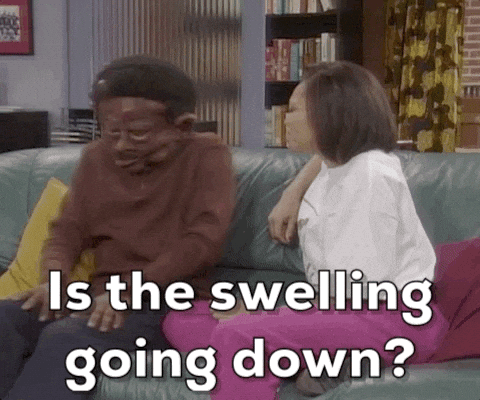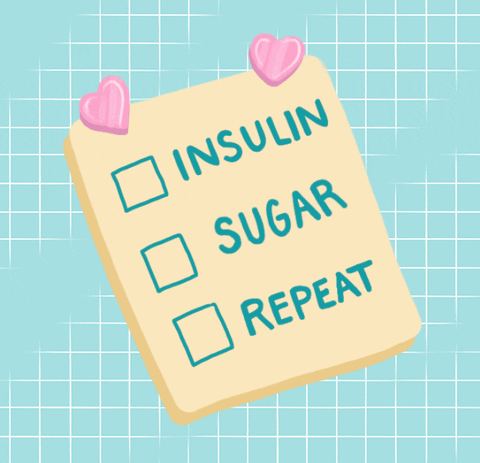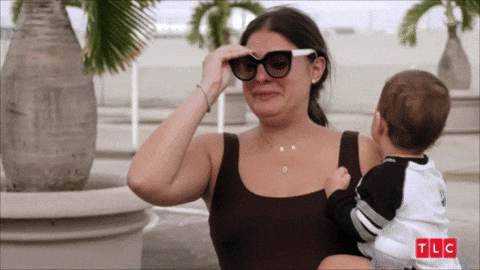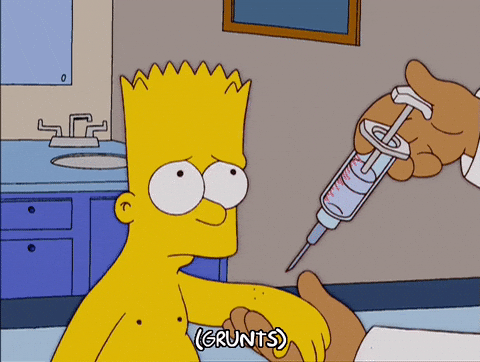Is Your Tightest Friendship Nothing More Than A Trauma Bond?

Yeah buddy. If ever there was a time when I recommend that you read an article when you're in a pretty good mood (meaning, not easily triggered) and you can be uninterrupted so that you take some time to process all that's been said, this one would be it. As someone who is quite clear on the fact that my first so-called friendship with a girl was the worst kind of trauma bond on the planet—one that paved the way for other trauma bonds to occur over the course of a lot of my life—I will give the heads up that while a write-up like this can provide all kinds of ah-ha moments, sometimes the reality of the truth can be quite jarring too.
Because, c'mon y'all—who ever really goes into a relationship, thinking that it is to be based on some form of trauma? And yet, whether a lot of us want to accept it or not…that is exactly what some of us do. Often. In part, because we don't get what a trauma bond actually is and/or how to avoid cultivating one before we find ourselves feeling wounded, heartbroken and/or devastated.
And here's the real trip of it all. While I've experienced a few trauma bonds with relatives and boyfriends, oftentimes folks don't realize that where they tend to be highly prevalent is in platonic situations. And listen, when your close friendships are toxic, that tends to affect, infect and negatively influence you in ways that you don't even realize—until you break free.
So, now that we're entering a new year and a new season, take a moment to see if one of your nearest and dearest friendships is actually one of the worst things that has ever happened to you. (Take a deep breath, now. Ready? Let's go.)
What Exactly Is a Trauma Bond?
" Trauma bond" is the kind of phrase that's used so much that it has taken on a lot of meanings. While I do personally think that an extension of a classic trauma bond is when two people connect on nothing more than unhealthy habits and/or brokenness and/or toxic personality traits (which means they aren't building on anything healthy, purposeful or meaningful), that isn't what a true trauma bond is all about.
A trauma bond is when a narcissist finds a victim to bring into their world and then manifests a cycle of abuse that becomes so unbelievably insane that 1) it's hard for the victim to even grasp what is going on and 2) even once they do, they don't really know how to get out.
Keeping this in mind, in order for a trauma bond to make even more sense, we should break down what some traits of a narcissist actually are.
A narcissist:
- Needs constant praise
- Is an ego maniac
- Intimidates and belittles others
- Is apathetic
- Makes everything be about them
- Feels envious of others
- Is obsessed with power, beauty and/or success
- Is a snob (thinks only certain people are "qualified" to be in their intimate space)
- Idealizes relationships in a way that is unrealistic
Off top, a sho 'nuf example of a narcissist is Donald John Trump. And while there are a billion and one reasons why that man has been able to get away with as much as he has, a big part of it is because so much of this country politically trauma bonded to him. For whatever the reason, they initially found him to be charming and/or funny and/or intriguing, he manipulated that, then proved himself to be nothing that he promised. Yet, because certain folks made him up to be something bigger in their own minds, the remained loyal anyway. They remain trauma bonded.
OK, but how does this all happen? Outside of political mayhem, how can people who seem to be really smart and self-aware still find themselves caught up? That's a really good question. I'll do my best to break it down.
How Do So Many of Us Get Caught Up in a Trauma Bond?
When it comes to how a person either becomes a narcissist or involved with one, it typically has to do with one's childhood. Oftentimes, narcissists grow up feeling abandoned or not properly nurtured in some way, so they create a really toxic way to self-preserve and self-persevere. On the other hand, a victim of a narcissist was usually raised by a narcissistic parent or caregiver (check out "What If It's Your Parents Who Happen To Be The Narcissists?"). As children, we want (and deserve) to be loved. When we're not, it can create voids (narcissism). Children are also innately very pure and desirous of wanting to make their parents or caregivers happy. When an abusive parent takes advantage of that, the child keeps doing more in hopes that their parents will be pleased. And since our parents are usually our first introduction to love, respect and relationships in general, we think that the emotional roller coaster ride that they put us on is how relationships are supposed to go. And so, in walks other narcissistic people who are more than ready, willing and able to take advantage of our vulnerability; especially since a lot of us aren't even aware that the shaky foundation that our parents created for us even exists.
So with that breakdown, I'm thinking that it might make sense how you can have a tight trauma bond with someone who you consider to be a really close friend. Because if that friend is a narcissist, then already something is "off". That said, do me a favor and think about the people who you consider to be in your inner circle. Do they have a huge ego? Do you find yourself praising them as they belittle you? Do you have moments when it seems like they are a closet hater or envious of you? Are you way more "into them" (committed, devoted, supportive) than they are into you (check out "Ever Wonder If A Friend Is Just...Not That Into You?")? Do they not seem interested in understanding what you need and how you feel?
Deeper still, have you not even really stopped to consider all of this because, up until now, the amount of time, effort and energy that you've put into the relationship has caused you to keep enduring what they are dishing out because you've chalked it up to being "That's just how they are" with a dash of ill-defined loyalty to them and the friendship?
Matter of fact, have you even stopped to ponder if you're even happy and fulfilled in your friendship? Because unfortunately, a lot of us seem to feel like that way of thinking should only be reserved for romantic relationships (or perhaps even professional ones), when the reality is you deserve to be happy, fulfilled and nurtured in every single relationship you've got. So, if all you and your homie have are "all these years" (shout-out to one of my favorite lines from the movie, Love Jones), no matter how much you love and care about them, not only is that not a good enough reason to remain in the relationship, chances are, you are subjecting yourself to abuse—a trauma bond.
What Does a Trauma Bond Between Friends Look Like?
If some of this is rattling you a bit and you would like a little more info, just to be sure, here are some signs that you could have a trauma bond with a so-called friend:
If your friend:
- Guilt trips you into getting you to do what they want you to do
- Uses manipulation to get what they desire
- Makes you feel uneasy or uncomfortable in some way and, if you bring it up, they not only attack you for doing so but find a way to make you feel like a bad person for even mentioning in
- Rarely takes accountability and responsibility for the wrong that they've done and, if they ever do, the remorse seems fake AF
- Never wants to deal with real issues within the relationship
- Has unrealistic expectations and/or are hypocritical in the sense that they expect you to do what they are unwilling to do in the friendship
- Is never wrong
- Is hypersensitive and/or super defensive most of the time
- Is self-righteous
- Hurts you, deflects, and then hurts you again (and it feels like a pattern)
While none of us are perfect (and anyone who feels otherwise about themselves; they too could easily fall into the narcissism demographic), if you've got someone in your life who you could easily check off 3-5 of these traits—while it might be a bitter pill to swallow, you very well could be involved with narcissist. Not only that but you could very easily be trauma bonded to them as well.
While we're here, another clear sign that there is some trauma bonding going on is if you read all of this, you feel a pit in the bottom of your stomach, and yet, your immediate inclination is to defend your friend or the dynamic rather than figure out a way to actually grieve the reality, heal yourself and set up some firm boundaries, moving forward. Because, I speak from personal experience when I say that, being in a relationship with a narcissist is a vicious cycle that absolutely will not change until 1) they are forced to face some consequences of their actions and 2) they get some assistance from a reputable counselor or therapist. Please never forget that it's pretty close to impossible for a narcissist to heal on their own because they've got to be humble enough to recognize that something is wrong with them and humility is a trait that narcissists simply do not have.
How to Heal from Breaking a Trauma Bond.
So, what are you saying, Shellie? If I've got a trauma bond with someone, I need to cut them off. Some of you may have check out an article that I wrote a couple of years back for the site entitled, "Why I Don't 'Cut People Off' Anymore, I Release Them Instead", so no, I don't necessarily recommend that you turn around and be as "violent" to a friend as they've been to you. What I will say, though, is if it is now abundantly clear that you've been in a relationship with a narcissist, why would you want to keep them in the honored and privileged space that really belongs to those who are going to love you right and well?
So yeah, for a season, I think that you should take some time away from the "friend", so that you can figure out what you want and need, what the counterproductive patterns have been and why you tolerated their BS for so long. It can help to journal out where you think your codependency in this area stems from and how long it's been going on. I'm all about you establishing firm and necessary boundaries with them in order to protect yourself from further harm. It can also be smart to come up with your own definition of what a real friend means to you, in this season of your life.
Also, I've always been about—and will continue to be about—creating pros and cons lists. That said, the friend who you think you are so close to and love so much, figure out the great things about having them in your life and the not-so-awesome ones.
Ask yourself if you're "in this" because that's just the way it is because you are afraid of what life looks like without them or you don't really have any other friends but that friend. If any of those reasons resonate, give yourself permission to accept that they simply aren't good enough. You should never remain in a friendship merely out of habit, fear, or loneliness. Besides, it's not until you remove yourself from your emotional abuser that you can get into friendships that are better for you anyway.
I know this was a lot to take in. Believe me when I say that I do. Yet your time and the very essence of your being are way too precious to be on a hamster wheel with someone who, at the end of the day, really doesn't have your best interest at heart; someone who mostly keeps you around, so that they have a tool to manipulate and a fan to make them feel like their stratagems really aren't "all that bad".
2020 was traumatic enough, don't you think? Purpose in your mind to go into 2021, releasing the pain, drama and lack of personal satisfaction that you actually can control. Start by shifting that trauma bond you've got with that friend of yours. It'll be one of the best decisions that you've ever made in your entire life. Trust me.
Join our xoTribe, an exclusive community dedicated to YOU and your stories and all things xoNecole. Be a part of a growing community of women from all over the world who come together to uplift, inspire, and inform each other on all things related to the glow up.
Featured image by Shutterstock
- 5 Things You Can Do Today To Be A Better Friend ›
- Oprah & Gayle Are Bringing Their 40+ Year Friendship To A New ... ›
- Signs You're The Toxic Friend Of The Group - xoNecole: Women's ... ›
- Oprah & Gayle Are Bringing Their 40+ Year Friendship To A New Series 'The OG Chronicles' ›
- 5 Things You Can Do Today To Be A Better Friend - xoNecole: Women's Interest, Love, Wellness, Beauty ›
- Signs You're The Toxic Friend Of The Group - xoNecole: Women's Interest, Love, Wellness, Beauty ›
- Am I Becoming A Narcissist? Signs And How To Stop - xoNecole ›
- A Trauma Bonding Relationship Is Toxic—Here Are Signs | Well+Good ›
- Is it possible to have trauma bond to a friend? : NarcissisticAbuse ›
- Trauma Bonds and Codependency: How to Break the Cycle ... ›
- 7 Signs You Have An Intense Emotional Bond With A Toxic Person ›
- Traumatic Bonding. One of the Reasons so Many Friendships Fall ... ›
This Is How To Keep 'Holiday Season Stress' From Infecting Your Relationship
Hmph. Maybe it’s just me, but it seems like there is something really weird happening in the fall season air (because winter doesn’t officially begin until December 21) that cuddle season is in full swing while break-up season is as well. In fact, did you know that break-ups are so popular during the holiday season that December 11 is deemed Break-Up Day?
The reasons why relationships shift around this time vary; however, I did both roll my eyes and chuckle when I read that a very popular one is because it’s an easy way to get out of getting one’s significant other a Christmas present. SMDH.
Anyway, I personally think that the less shallow folks out here may contemplate calling things “quits” or they at least distance themselves a bit from their partner (and what I’m referring to is serious relationships) due to all of the stress and strain that oftentimes comes with the holidays whether it be financial, familial, due to their tight schedules or something else.
Listen, I would hate for you and your man to miss the fun and happiness of experiencing this time of year, all because you are so overwhelmed or irritated that you can’t really enjoy it. That’s why I have a few practical tips for how to avoid allowing the typical holiday season stress from INFECTING your relationship.
Manage Your Expectations
 Giphy
GiphyUnmanaged expectations. If there is a main reason why the holiday season tends to be so stress-filled for so many people, I’d bet good money that this is the cause. And when you’re in a long-term relationship, expectations can manifest themselves in all sorts of cryptic and/or unexpected ways. You might have relatives who assume that you are going to be with them for Thanksgiving or Christmas when you have other plans in mind. You might be thinking that you are going to spend one amount for presents while your man is thinking something totally different. When it comes to scheduling, your signals may be crossed.
And you know what? To all of these scenarios, this is where clear and consistent communication come in. Don’t assume anything. Don’t dictate anything either. From now until New Year’s, mutually decide to check in once a week, just to make sure that you are both on the same page as it relates to the holidays and what you both are thinking will come along with it. The less blindsided you both feel, the less stressed out you will be. Trust me on this.
Set (and Keep) a Budget
 Giphy
GiphyOkay, so I read that last year, 36 percent of Americans incurred some type of holiday-related debt. Hmph. Last year, there was still some sense of normalcy in this country, chile, so I can only imagine what finances are gonna look like over the next several weeks. That said, since I don’t know a lot of people who don’t find being broke stressful, make sure that you and your bae set a budget and then stick to it this year — no ifs, ands or buts.
Because really, y’all — it doesn’t make sense to deplete savings and/or max out credit cards for a few days of giggles only to be damn near losing your mind because you don’t know how to make ends meet come Dr. Martin Luther King, Jr. Day.
And by the way, this tip doesn’t just speak to things like food and gifts; I also mean travel. If it doesn’t make a ton of sense (or cents) to be all over the place this year — DON’T BE.
Keep Matthew 5:37 at the Forefront
 Giphy
GiphyIf off the top of your head, you don’t know what Matthew 5:37 says, no worries, here ya go: “But let your ‘Yes’ be ‘Yes,’ and your ‘No,’ ‘No.’ For whatever is more than these is from the evil one.” That verse right there? Oh, it’s a boundaries lifesaver! I say that because do you see “maybe” or “I’ll think about it” in there? Nope. LOL. It says that you should tell people “yes” or “no” and leave it at that — and that complements Anne Lamott’s quote, “’No’ is a complete sentence” impeccably well. Yeah, you’ve got to remember that anything beyond a yes or no to a request is privileged information; you don’t owe anyone details or an explanation.
Besides, if you are really honest with yourself, when someone asks you something and you give a “Umm, let me think about it” kind of reply, more times than not, you already know what your answer is going to be — so why not let you both off of the hook? Give your response. Commit to that. And let everyone (including yourself) get on with their lives and schedules.
I promise you that when it comes to those holiday parties, you are pissing more folks off by not RSVP’ing or doing so and not showing up than just saying, “Thank you but not this year” off the rip.
Remember That Your Personal Space Is Privilege Not a Right
 Giphy
GiphyA friend of mine recently bought a new house and invited me over to come see it. He’s a single man with no children, so as I was taking in all of the space that he had, especially as I walked through his finished basement, I joked about relatives coming to live with him. “Hell no” and “absolutely not” were pretty much his immediate responses as he went on to say that some folks even had the nerve to be offended when he told them that he had no intentions on taking DNA in.
Ain’t it wild how people think that your stuff is their right? And yes, that brings me to my next point. Your home is your sanctuary space. If you want to host folks this year — cool. If not, ALSO COOL. Please don’t let folks (family included) guilt you into how they want you to act or even into what they would do if the shoe was on the other foot. You are not them — and as one of my favorite quotes states, “If two people were exactly alike, one of them would be unnecessary.” (A man by the name Larry Dixon said that.)
Hell, my friends? They know that I am good for sending them random things that they need or even want all throughout the year. Coming over to hang out at my pace, though. Uh-uh. Chalk it up to being a card-carrying member of the ambivert club yet I like keeping my living space personal — and I sleep like a baby, each and every night, for feeling that way.
Always remember that your space, your time, your resources, your energy and shoot, yourself period (including your relationship), are all things that are your own. You get to choose how, when and why you want to share them. The holiday season is certainly no exception.
Cultivate Some “You Two Only” Traditions
 Giphy
GiphyIt’s not uncommon for some couples to hit me up after the holiday season to “detox.” Sometimes it’s due to the financial drama (and sometimes trauma) that they experienced. Sometimes it’s because they allowed their relatives (especially in-laws) to get more into their personal business than they should’ve. More than anything, though, it tends to be because they didn’t get enough quality time together and so ended up feeling “disconnected.”
Please don’t let that happen. Listen, I’m not even a holidays kind of woman and yet, I will absolutely sit myself down with some hot chocolate and chocolate chip cookies to enjoy a Hallmark holiday film or two. Aside from the fact that most of them are lighthearted and sweet, I also like that they usually focus on couples loving on each other amidst all of the holiday beauty and ambiance — which is something that all couples should set aside some time to do.
Maybe it’s a vacation. Maybe it’s a staycation. Or maybe it’s my personal favorite, A SEXCATION. Whether it’s for a few days, the weekend or even overnight — don’t you let the holidays go by without setting aside time for you and your man to celebrate one another. Don’t you dare (check out “Are You Ready To Have Some Very Merry 'Christmas Sex'?”).
GET. SOME. REST.
 Giphy
GiphyI once read that 8 out of 10 people get stressed out over the holidays and 3 out of 10 lose sleep during to it — and when you’re stress-filled and sleep-deprived, that can absolutely lead to hypersensitivity, making mountains out of molehills and even not being in the mood for sex.
Your relationship can’t afford to go through any of this, so definitely make sure to prioritize rest. I don’t care how unrealistic it might seem during this time, sleep should never be seen as a luxury; it will always and forever be a great necessity.
That said, try to get no less than six hours of shut-eye in (check out “6 Fascinating Ways Sex And Sleep Definitely Go Hand In Hand”) and even ask your bae to take a nap with you sometimes (check out “Wanna Have Some Next-Level Sex? Take A Nap, Sis.”). Not only will sleep help to restore your mind, body and spirit but, when it’s with your partner, it’s an act of intimacy that can make you both feel super connected, even in the midst of what might feel like chaos.
___
Holiday season stress is real. Still, never give it the permission or power to throw your relationship off. Put you and your man first and let the holidays be what they are gonna be, chile.
Let’s make things inbox official! Sign up for the xoNecole newsletter for love, wellness, career, and exclusive content delivered straight to your inbox.
Featured image by Shutterstock
While doing a podcast interview a couple of weeks ago, when I said my age, the interviewer complimented me by saying that what I said is not what they would’ve guessed. When they asked what the secret was, the first thing that came out of my mouth was, “Oh, I’m gonna take me a nap.”
I adore sleep. I’ve said before that it’s like what Six Flags is to some people. And really, it’s just a plus that there are so many health benefits from getting plenty of rest. Beauty-wise, science does reveal that getting no less than seven hours a night can slow down signs of aging. Know what else? There are some direct things that sleep — and the lack thereof — can do to your immunity as well.
And so, since this is the time of year when catching a cold (and/or the flu) is common, let’s talk about the impact that sleep (and again, a lack thereof) has on your immune system. That way, you can remain as healthy as possible during the fall and winter seasons.
1. Less Sleep Means More Colds
 Giphy
GiphyLike I stated in the intro, I’m pretty sure you’ve heard somewhere that the fall and winter are the seasons when people are most susceptible to catching a cold or coming down with the flu. And that’s exactly why I thought I would start this all off by sharing the fact that some studies reveal that if you get less than six hours of sleep, on a consistent basis, you end up making yourself more vulnerable to coming down with both. In fact, some research says that only 18 percent of people who get six-plus hours of rest caught a cold while almost 40 percent who got less than that did.
The logic behind it all is sleep gives your body time to build up the proteins and cells (like cytokines and T-cells) that you need to fight off certain viruses. So, if nothing bothers you more than having a stuffy nose or stubborn cough when it’s cold outside, getting more sleep is one way to prevent that from happening to you.
2. Less Sleep Means More Allergy Symptoms
 Giphy
GiphyAt the end of the day, an allergy is basically what transpires whenever your immune system “overreacts” to something that other people’s systems do not. And since sleep is what helps to keep your immune system nice and strong — well, I’m sure you get how less allergy-related symptoms and more sleep go hand in hand. Also, since sleep helps to decrease bodily inflammation (more on that in a bit) and inflammation can also intensify allergy symptoms, that’s just one more reason to get as much shut-eye as possible.
3. Less Sleep Means Potential Diabetes and Heart Disease
 Giphy
GiphyDid you know that in 2024, Black women were diagnosed with diabetes 24 percent more than any other adult demographic. Also, it continues to be a reality that heart disease is the leading cause of death for Black women. These two sobering statistics alone should be enough of an incentive to do whatever you can to keep the risk of diabetes and heart disease way down.
One way to do that is by getting more sleep. Aside from the fact that sleep strengthens your immune system to where it is easier for you to fight off illness and diseases, sleep can keep your blood sugar levels in a healthy space; plus, when it comes to your heart, it gives it, along with your arteries and blood vessels a break.
4. Less Sleep Means Less Time for Your Body to Push “Reset”
 Giphy
GiphyIf you really stopped to consider all that your body goes through during the day (you can read some about that here), you definitely would respect it enough to do your best to thank it by giving it no less than six hours of sleep, each and every night. Sleep is what helps to slow your brain and body down so they are able to “refuel” for the next day. After all, how can your body prevent you from getting sick if your immune system is too worn out to fight ailments off? Exactly.
5. More Sleep Helps You to Fight Off Infections
 Giphy
GiphySpeaking of, in order for your body to fight off infections, there are certain cells and antibodies within you that need to be healthy and strong — one way that they get and stay that way is by you getting a good amount of sleep. For instance, remember when I touched on cytokines earlier? Well, the same way that they help to prevent colds, they also help to prevent infections too. And since sleep lowers your cortisol (stress) levels, rest gives your body the time and space to build up an army that can fight off free radicals and other health-related challenges while you are awake.
6. More Sleep Lowers Bodily Inflammation
 Giphy
GiphyWhenever a health-related issue is mentioned on this platform, inflammation is something that is mentioned quite a bit. Probably the easiest way to explain inflammation is it’s how your body responds/reacts whenever something is happening to your body that shouldn’t be, whether it’s an illness, an injury, a germ or something that you may be allergic to.
If you happen to have chronic inflammation, some symptoms that are associated with that include fatigue, stiff joints, skin rashes, weight gain and moodiness.
The interesting thing about all of this is if you aren’t getting enough rest, you could be triggering inflammation in your body. That’s because studies reveal that a lack of sleep can elevate molecules that are associated with inflammation. So, if you don’t want inflammation to increase within your system, you should definitely catch more zzz’s.
7. More Sleep Regulates Hormones
 Giphy
GiphyWhen it comes to hormones like serotonin, estrogen and cortisol, believe it or not, they play a role in how your immune system acts and overreacts. That’s because, if your hormones are out of balance, that can cause your immune system to work harder than it actually should and that can make you more vulnerable to sickness. One way to keep your hormones leveled out? SLEEP.
That’s because sleep gives your body the opportunity to rest, repair and restore your hormone levels. On the other hand, when you are sleep deprived, that can put/keep your hormones on the ultimate roller coaster ride. #notgood
8. More Sleep Strengthens Vaccines
 flu shot GIF - Find & Share on GIPHYGiphy
flu shot GIF - Find & Share on GIPHYGiphyIf you’re someone who is good for getting some sort of vaccine around this time of the year, make sure that you rest up before and after getting your shots. Not only does adequate rest before a vaccination help your immune system to be better receptive to your shots but sleep also helps your body to build up enough antibodies to make your vaccinations effective after getting them. Because if you’re gonna get pricked, shouldn’t it be worth it? My thoughts exactly.
Get some freakin’ sleep! Your immune system depends on it.
Let’s make things inbox official! Sign up for the xoNecole newsletter for love, wellness, career, and exclusive content delivered straight to your inbox.
Featured image by Shutterstock









